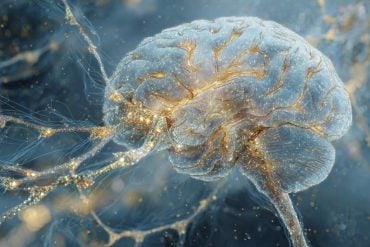Summary: A new study suggests the taste or smell of food acts on sensory neurons, which could produce a type of aging hormone.
Source: POSTECH.
Animals can perceive changes in many environmental factors such as temperature and the taste or smell of foods. This is achieved by specialized nerve cells called sensory neurons. Interestingly, sensory neurons have been known to control the rate of aging in various animals, including the tiny free living roundworm C. elegans.
The impairment of sensory neurons has been known to delay aging by switching on the action of a well-known anti-aging protein called FOXO. FOXO then turns on the gene’s encoding proteins that protect cells and repair damages in various body parts. However, how sensory neurons influence the activity of the anti-aging FOXO proteins in an entire animal has remained a mystery.
Prof. Seung-Jae Lee and PhD candidate Murat Artan at Pohang University of Science and Technology (POSTECH), Korea, hypothesized that the smell or taste of food acts on sensory neurons, which may produce a type of aging hormone. This aging hormone may be delivered to various body parts and may affect the action of FOXO proteins. The team discovered that the smell or taste of food can directly shorten lifespan by affecting sensory neurons that produce insulin-6, an insulin hormone-like factor. They also showed that insulin-6 from sensory neurons alters the action of FOXO in various tissues. Their findings were published in Genes & Development as the cover article.
They then attempted to turn on the function of only a pair of food-sensing sensory neurons by a blue light, a technique called optogenetics, to mimic the taste of food. Prof. Lee and Mr. Murat discovered that blue light itself can decrease the lifespan of animals through producing insulin-6 hormone that leads to the reduction of FOXO action without food taste or smell.

It has been shown that perception of food increases the level of blood insulin hormone levels in humans. In addition, many biological processes related to aging are similar in C. elegans and mammals which include humans. Therefore, the team concluded that it is unsurprising to find that food smell or taste play similar roles in the aging of mammals via sensory neurons and hormones like insulin.
Source: YunMee Jung – POSTECH
Image Source: This NeuroscienceNews.com image is in the public domain.
Original Research: Abstract for “Food-derived sensory cues modulate longevity via distinct neuroendocrine insulin-like peptides” by Murat Artan, Dae-Eun Jeong, Dongyeop Lee, Young-Il Kim, Heehwa G. Son, Zahabiya Husain, Jinmahn Kim, Ozlem Altintas, Kyuhyung Kim, Joy Alcedo, and Seung-Jae V. Lee in Genes & Development. Published online April 28 2016 doi:10.1101/gad.279448.116
[cbtabs][cbtab title=”MLA”]POSTECH. “Sensory Neurons Modulate Aging Hormone.” NeuroscienceNews. NeuroscienceNews, 26 May 2016.
<https://neurosciencenews.com/foxo-aging-sensory-neurons-4313/>.[/cbtab][cbtab title=”APA”]POSTECH. (2016, May 26). Sensory Neurons Modulate Aging Hormone. NeuroscienceNews. Retrieved May 26, 2016 from https://neurosciencenews.com/foxo-aging-sensory-neurons-4313/[/cbtab][cbtab title=”Chicago”]POSTECH. “Sensory Neurons Modulate Aging Hormone.” https://neurosciencenews.com/foxo-aging-sensory-neurons-4313/ (accessed May 26, 2016).[/cbtab][/cbtabs]
Abstract
Food-derived sensory cues modulate longevity via distinct neuroendocrine insulin-like peptides
Environmental fluctuations influence organismal aging by affecting various regulatory systems. One such system involves sensory neurons, which affect life span in many species. However, how sensory neurons coordinate organismal aging in response to changes in environmental signals remains elusive. Here, we found that a subset of sensory neurons shortens Caenorhabditis elegans’ life span by differentially regulating the expression of a specific insulin-like peptide (ILP), INS-6. Notably, treatment with food-derived cues or optogenetic activation of sensory neurons significantly increases ins-6 expression and decreases life span. INS-6 in turn relays the longevity signals to nonneuronal tissues by decreasing the activity of the transcription factor DAF-16/FOXO. Together, our study delineates a mechanism through which environmental sensory cues regulate aging rates by modulating the activities of specific sensory neurons and ILPs.
“Food-derived sensory cues modulate longevity via distinct neuroendocrine insulin-like peptides” by Murat Artan, Dae-Eun Jeong, Dongyeop Lee, Young-Il Kim, Heehwa G. Son, Zahabiya Husain, Jinmahn Kim, Ozlem Altintas, Kyuhyung Kim, Joy Alcedo, and Seung-Jae V. Lee in Genes & Development. Published online April 28 2016 doi:10.1101/gad.279448.116






